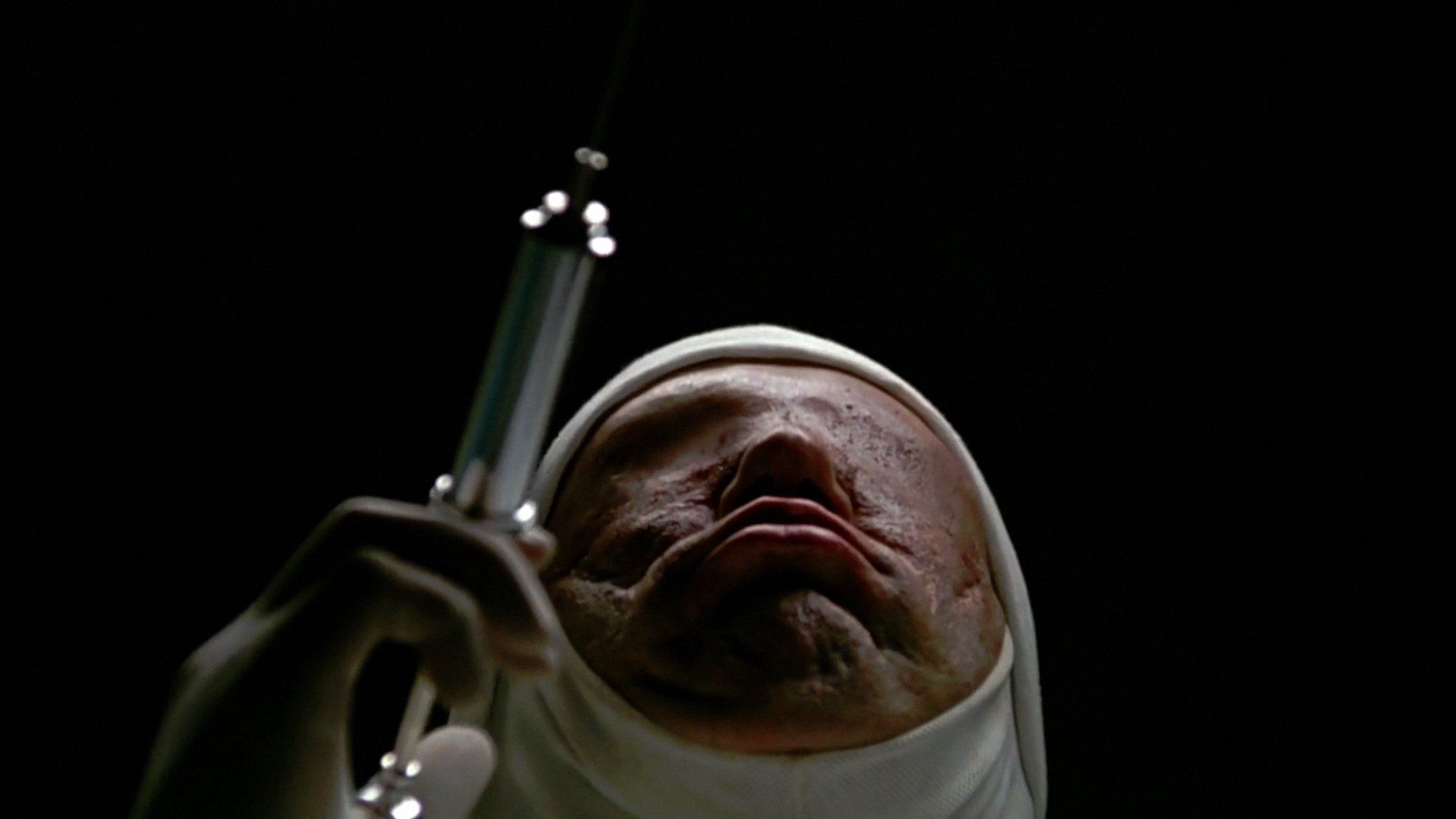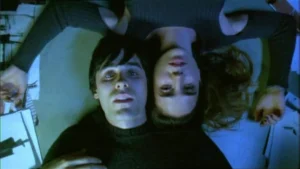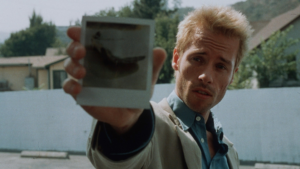Table of Contents
Introduction: The Enigmatic World of Jacob’s Ladder
In Jacob’s Ladder, directed by Adrian Lyne, viewers are plunged into a disorienting journey that blurs the lines between reality and illusion. The film presents a haunting narrative steeped in psychological and philosophical themes, compelling audiences to examine their own understanding of existence and the mind’s labyrinthine pathways. With the keyword Jacob’s Ladder explained at the forefront, this analysis navigates the intricate depths and implications of the story.
The film artfully portrays the psychological trauma experienced by soldiers returning from the Vietnam War. It delves into the profound effects of war, shaping not only the psyche of its protagonist, Jacob Singer, but also urging us to question the very nature of reality. As we dissect the plot, we will explore how each element contributes to creating a tapestry rich in psychological insight and philosophical inquiry.
Join us as we unravel the layers of Jacob’s Ladder, providing clarity to its complex narrative while exploring the deeper meanings woven throughout this disturbing yet thought-provoking piece of cinema.
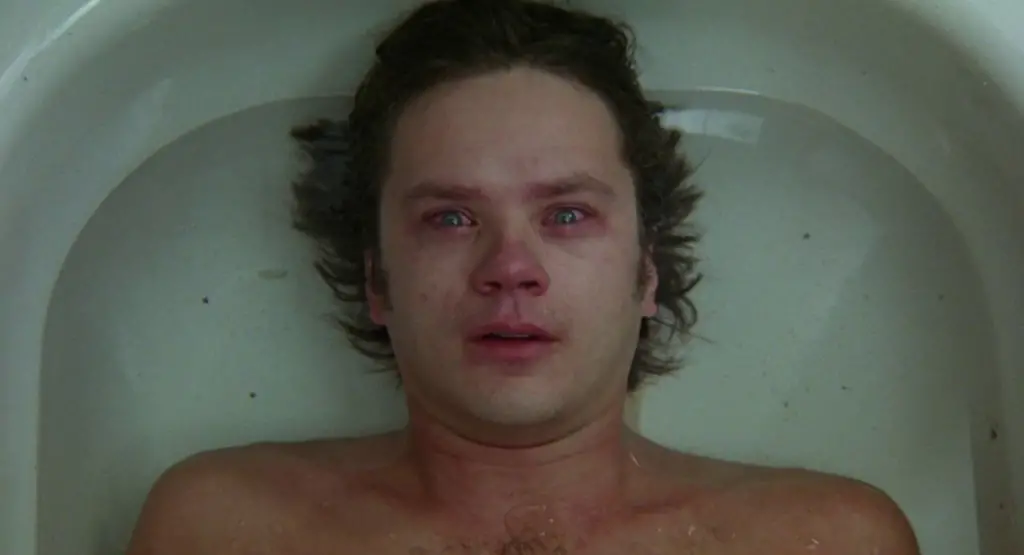
The Psychological Trauma of War: A Deeper Look
The Burden of Combat
In Jacob’s Ladder, the protagonist Jacob Singer grapples with the devastating consequences of his service in the Vietnam War. This film brings to light the profound psychological trauma that many veterans endure, often referred to as Post-Traumatic Stress Disorder (PTSD). Jacob’s disorienting experiences can be seen as a manifestation of his unprocessed trauma, illustrating the lasting impact of combat on the human psyche.
The haunting images and nightmarish sequences display how memories from the battlefield invade Jacob’s reality, effectively blurring the lines between what is real and what is invented by a tormented mind. These experiences resonate with countless veterans who struggle to reintegrate into civilian life, often plagued by flashbacks and feelings of isolation.
Hallucinations and Reality
One of the film’s most significant themes is the exploration of hallucinations. Jacob’s vivid and often terrifying hallucinations serve as a means for the audience to understand the depths of his suffering. They not only emphasize his internal struggles but also reflect the confusion that many veterans experience when trying to reconcile their wartime memories with civilian life.
The use of surreal imagery throughout the film offers a glimpse into Jacob’s fractured mind, highlighting a critical aspect of psychological trauma: individuals may create alternate realities as coping mechanisms. This poignant portrayal raises important questions about the nature of reality itself. Is what we perceive reliable, or can the mind distort reality in ways that render it unrecognizable? In the context of war, the film compels us to confront the delusions and disconnections faced by those like Jacob, immersing us in an experience that is as unsettling as it is enlightening.

The Search for Connection
Amidst the chaos of his mind, Jacob fiercely seeks connection with individuals from his past, particularly his former lover. This quest serves as a poignant reminder of the human need for companionship and understanding. For veterans, the search for connection can be a double-edged sword; while it may offer solace, it can also be fraught with the fear of being misunderstood or alienated.
Throughout Jacob’s Ladder, this longing is mirrored in interpersonal relationships that often appear strained or fragmented. Jacob’s struggle to grasp the threads of reality speaks to a broader truth: war can sever bonds that people once relied upon for emotional support. The psychological weight of such separation adds another layer to the torment faced by veterans, who are not only haunted by their own memories but are also faced with the profound isolation that can follow them long after the chaos of war has subsided.
The Philosophical Implications of Reality and Illusion
The Nature of Perception
Jacob’s Ladder challenges viewers to question the nature of perception and reality itself. Throughout the film, Jacob Singer’s experiences oscillate between vivid hallucinations and unsettling moments of clarity, forcing the audience to confront the idea that reality may be subjective. This notion resonates with philosophical inquiries into the nature of existence and the reliability of our senses.
The film presents a world where what we see might not be what truly exists, echoing philosophical doctrines such as Idealism and Phenomenology. Jacob’s disorienting perception invites us to consider whether reality is an absolute truth or merely a product of our individual experiences. As we journey with Jacob, we are left to ponder the possibility that reality can be intrinsically tied to emotional states, making it as mutable as the mind itself.
The Illusion of Control
Another critical theme in Jacob’s Ladder is the illusion of control. Jacob experiences a gradual realization that the world around him is like a dream—elusive and unpredictable. This existential dilemma mirrors the philosophical concept of Determinism, where questions arise about free will versus fate. Jacob’s struggle highlights the paradox of human existence: while we attempt to exert control over our lives, external forces—be it war, trauma, or the unpredictability of life—often dictate our paths.
The film’s surreal sequences serve as a metaphor for the loss of agency. As Jacob descends deeper into his psychological maze, his attempts to regain control over his narrative become increasingly futile. This exploration of control delves into the broader philosophical discourse on agency and the limitations placed upon individuals by their circumstances.

Redemption and the Search for Truth
Ultimately, Jacob’s Ladder becomes a meditation on the search for truth amidst chaos. As Jacob grapples with his identity and the world around him, he embarks on a journey that seeks to reconcile the illusions created by his mind with the reality of his existence. This quest for truth not only reflects an individual struggle but also speaks to a universal human desire to find meaning in suffering.
The film suggests that understanding the nature of reality may require confronting our deepest fears and insecurities. Jacob’s journey—marked by surreal visions and painful memories—reveals that exposing oneself to the uncomfortable truths of life can lead to a form of redemption. The philosophical implications of this exploration resonate with existentialist thought, which emphasizes the importance of personal responsibility and the quest for authenticity in an often absurd world.
The Nature of Existence: Exploring Identity and Consciousness
Fragmented Identity
In Jacob’s Ladder, the exploration of identity emerges as one of the film’s most compelling themes. Jacob Singer’s character grapples with an identity that feels fractured and unmoored following his traumatic experiences in Vietnam. As he traverses through his nightmarish perceptions, the film poses profound questions about what constitutes the self. Is identity a fixed entity, or is it fluid, shaped by experiences and perceptions?
Jacob’s deteriorating sense of identity reflects a broader commentary on how trauma can fragment the self. The memories of the battlefield haunt him, altering how he perceives not only himself but also his relationships and environment. This fragmentation can resonate with viewers on a personal level, as many individuals experience shifts in identity during times of intense strain. Jacob’s journey invites us to interrogate whether we are the sum of our experiences or if our essence can withstand the trials of life.
Consciousness and Reality
The film intricately weaves a narrative that prompts contemplation about the nature of consciousness. Jacob’s experiences blur the boundaries of consciousness, as his perceptions oscillate between reality and hallucination. This exploration brings to the forefront philosophical inquiries into the nature of the mind and how consciousness shapes our understanding of the world.
In essence, Jacob’s consciousness becomes a labyrinth, where the past and present collide. As viewers, we are urged to consider how our own consciousness influences the way we interpret our surroundings. The film reflects a contemporary interest in consciousness studies and the complexities of cognitive understanding, revealing that perception can greatly alter one’s grasp of reality.
The Search for Meaning
As Jacob navigates the many layers of his experiences, the search for meaning emerges as a significant theme. The film posits that human existence is often riddled with ambiguity and sorrow, prompting the question: how does one find purpose amidst such chaos? Jacob’s quest highlights a universal endeavor to seek answers to life’s most profound questions, particularly those surrounding suffering and existence itself.
In this journey, the film challenges the notion that suffering is merely an obstacle. Instead, it suggests that through pain, individuals can uncover deeper truths about themselves and their place in the world. The interplay between struggle, identity, and consciousness invites viewers to reflect on their own lives and the experiences that shape their identities.

Ending Explained: The Unraveling of Jacob’s Reality
The Final Sequence
The conclusion of Jacob’s Ladder presents a striking unraveling of realities, culminating in a montage of Jacob Singer’s experiences that leads to profound revelations. Throughout the film, Jacob has been subjected to horrific hallucinations and memories of his time in Vietnam, but as the narrative reaches its climax, viewers are confronted with a harrowing truth. The final sequences suggest that Jacob is, in fact, a soldier on his deathbed, experiencing a series of visions as his life slips away.
This notion reframes everything we have witnessed throughout the film, shifting Jacob’s experiences from mere trauma-induced hallucinations to poignant reflections on his life. It forces us to confront the fragility of existence, as his desperate attempts to make sense of his shattered reality become a metaphor for the broader search for meaning in the twilight moments of life. The pain and chaos that envelop Jacob morph into a layering of regret and longing, leading viewers to empathize with his plight.
Acceptance and Release
As Jacob navigates through the labyrinth of his mind, he ultimately finds moments of clarity intertwined with sorrow. The presence of loved ones symbolizes the connection to life he yearns for, culminating in an emotional confrontation with his own mortality. In the film’s denouement, Jacob’s acceptance of his fate allows for a release from the torment that has plagued him throughout.
This acceptance transforms the narrative into one not only of personal tragedy but also of reconciliation with life’s inevitabilities. It is through confronting the specter of death that Jacob gains insight into his past, embracing both the beauty and pain of his memories. This catharsis highlights a philosophical perspective on existence, suggesting that understanding and acceptance of one’s reality can lead to liberation from suffering.
The Symbolism of the Ladder
The film’s title, Jacob’s Ladder, itself serves as a potent symbol that resonates throughout the climax. In biblical context, Jacob’s ladder represents the connection between earth and the divine realm, symbolizing a journey towards enlightenment. As Jacob’s reality unravels, the idea of ascending towards understanding becomes increasingly relevant.
In the final scenes, the ladder metaphor becomes a representation of Jacob’s ascent towards acceptance, hope, and ultimately, peace. It transcends the traditional narrative of descent into chaos and despair, illustrating that the act of confronting one’s reality—no matter how grim—can lead to spiritual elevation. The moment where Jacob appears to find solace serves as a reminder that even amidst the darkness, there lies the potential for understanding and transcendence.

Visual and Narrative Techniques: Crafting a Disturbing Dreamscape
Surreal Imagery and Symbolism
Jacob’s Ladder employs a range of surreal imagery and symbolism to envelop the audience in a disorienting experience that mirrors the protagonist’s psychological state. The film is marked by unsettling visuals that blur the lines between reality and hallucination. These images are rendered in a dreamlike manner, often featuring dark lighting, eerie sound design, and abrupt transitions that contribute to a sense of dread.
The use of visual symbolism plays a crucial role in conveying the emotional weight of Jacob’s trauma. For instance, the recurring visions of twisted faces and shadowy figures encapsulate his fears and regrets, serving as tangible manifestations of his internal struggles. Such imagery invites viewers to reflect on the ways trauma can distort perception, creating an unsettling yet impactful representation of Jacob’s mental landscape.
Non-linear Narrative Structure
The film’s non-linear narrative structure further intensifies the sense of disorientation, reflecting the fragmented nature of Jacob’s consciousness. By interweaving flashbacks, dreams, and hallucinations, the storytelling creates a kaleidoscope of experiences that challenge viewers to parse through layers of reality. This technique effectively immerses the audience in Jacob’s confusion, as they, too, grapple with the shifting timelines and perspectives.
This fragmented style not only emphasizes Jacob’s psychological distress but also reflects broader themes of memory and identity. The audience is left to piece together Jacob’s past and present, mirroring his own search for clarity amid chaos. As we navigate this tumultuous journey alongside him, the disjointed narrative serves to deepen our empathy for his plight, enhancing the emotional impact of the film.
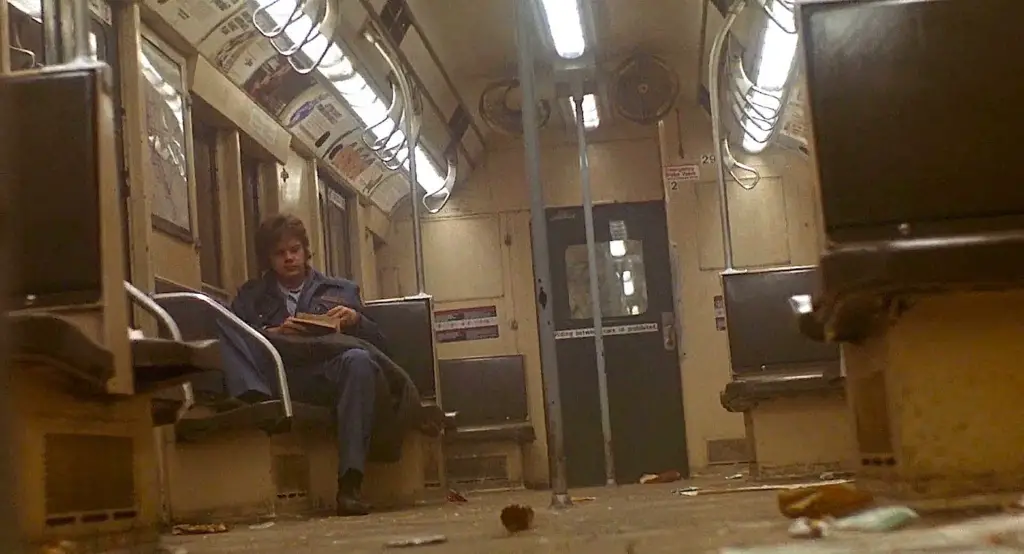
Innovative Sound Design
An equally important component in crafting the film’s disturbing atmosphere is its innovative sound design. From dissonant soundscapes to abrupt auditory shifts, the film utilizes sound to evoke a visceral emotional response. The incorporation of jarring noises, coupled with ethereal sounds, creates an immersive experience that heightens the sense of dread permeating Jacob’s reality.
This auditory approach complements the visual storytelling, ensuring that every moment resonates with psychological intensity. The haunting score, combined with unsettling sound effects, invites audiences to feel the weight of Jacob’s experiences. The resulting audio-visual synergy renders the film a deeply immersive exploration of psychological horror, compelling us to consider the intricate connections between sound and the human mind.
Thought-Provoking Reads: Book Recommendations Aligned with the Film’s Themes
For those intrigued by the psychological and philosophical themes explored in Jacob’s Ladder, here are five thought-provoking reads that delve into similar concepts of trauma, identity, and the nature of reality.
One highly recommended book is “The Body Keeps the Score” by Bessel van der Kolk. This groundbreaking work explores how trauma affects both the mind and the body, providing insight into PTSD and the paths toward healing. van der Kolk’s compassionate approach resonates with Jacob’s struggles and offers readers a deeper understanding of the psychological aftermath of trauma. Buy “The Body Keeps the Score” here
Another compelling read is “Man’s Search for Meaning” by Viktor E. Frankl. This profound memoir recounts Frankl’s experiences in Nazi concentration camps, emphasizing the crucial role of finding purpose even amidst unimaginable suffering. The book’s insights parallel Jacob’s journey toward understanding his existence amid chaos and despair. Buy “Man’s Search for Meaning” here
“The Stranger” by Albert Camus is a classic existential novel that examines themes of absurdity and the search for identity. The protagonist, Meursault, embodies a disconnection from reality that echoes Jacob’s own perceptions as he struggles to find meaning in a chaotic world. This novel prompts reflection on the nature of existence and the human condition similar to that portrayed in Jacob’s Ladder. Buy “The Stranger” here
For those interested in the psychological aspects of memory and identity, “Memory: A Very Short Introduction” by Jonathan P. T. Bock is a succinct yet insightful exploration of how memories shape our understanding of ourselves. It discusses memory’s fallibility, which resonates with Jacob’s fragmented sense of identity throughout the film. Buy “Memory: A Very Short Introduction” here
Lastly, consider “Where the Crawdads Sing” by Delia Owens. Although it is a work of fiction, it offers deep insights into themes of isolation, survival, and connection to nature. The protagonist’s journey of self-discovery reflects the inner turmoil Jacob faces, inviting readers to explore their perceptions of identity and belonging. Buy “Where the Crawdads Sing” here
Conclusion: Reflecting on the Layers of Jacob’s Ladder
As we delve into Jacob’s Ladder, it becomes clear that the film serves as a complex exploration of the human psyche and the nature of reality. The keyword Jacob’s Ladder explained encapsulates not only the intricate narrative but also the rich psychological and philosophical themes that resonate throughout the story.
By examining the psychological trauma of war, the illusion of control, and the quest for identity, the film challenges viewers to confront their own perceptions and understanding of existence. Through surreal imagery and innovative narrative techniques, Jacob’s Ladder provides a haunting portrayal of a man struggling to reconcile his past with the present, leaving us with profound questions about memory, reality, and the essence of being.
Ultimately, the film invites us to reflect on our own journeys through pain and despair, encouraging a deeper appreciation for the complexity of the human experience. In deciphering the layers of Jacob’s reality, we are reminded of the resilience of the human spirit and the search for meaning even in the darkest of times.
Take a look at all our in-depth reviews here.

